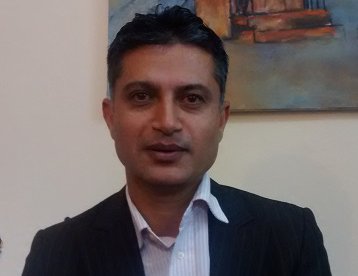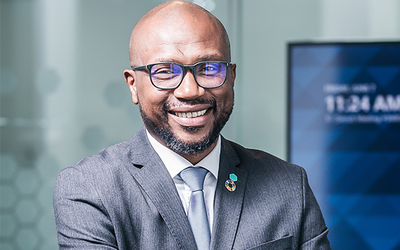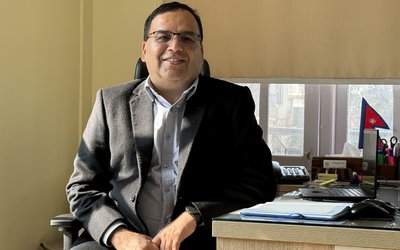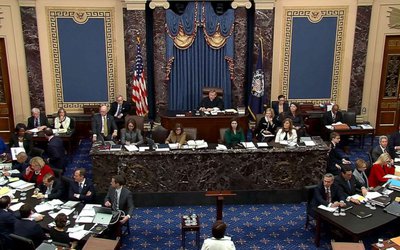
How do you see the role of INGOs in the post-earthquake situation?
INGOs have played a very important role in the rescue and relief operations following the earthquake of April 25, reaching the remote parts of Nepal side by side with Nepal's security forces, Nepal Army, Nepal Police and Nepal Armed Police. INGOs reached almost all remote parts of the earthquake devastated areas. I am proud that our community fulfilled its mission to serve the people in this difficult time. All INGOs need to be proud of that. We fulfilled our responsibility well.
Nepal is now heading towards the second phase or period of reconstruction. What role do INGOs want to perform?
The relief operation is yet to complete and the monsoon is closer. Even without the monsoon, our highways often shut down due to landslides. The situation is going to be more difficult due to floods and landslides. The earthquake has badly shaken our land and torrential rain will accelerate the process of erosion and landslide. In this context, many of our roads will be destroyed badly. All INGOs are now focusing on temporary shelter. This is working in between the first and second phases. What do we want is a majority people should have a safe shelter now. The natural disaster can displace many people. We want them to live safe, with adequate food, too.
How do you see the role of Karuna?
Karuna is now constructing over 2,000 temporary shelters in different parts of Nepal, in Rasuwa, Bhaktapur, Dhading and Nuwakot as well as in Kathmandu. In Rasuwa we are covering all Ramche VDC with 600 plus families -- with either traditional Nepalese huts with zinc and local materials. We have already completed 400 temporary shelters in Kathmandu and Lalitpur. This is for the persons with disability and others.
How do you see the level of coordination with the government agencies?
We have been trying our best to coordinate with the government to carry out our work. Our local partners are working with the District Disaster Committees and we are also following their guidelines. However, the government is once again in poor state of communication. There is a very big gap in communicating with international donors, including the INGOs. INGOs have strong capabilities and we reach throughout the country. But this is costly. As we are visible everywhere, people easily target us. We are trying our level best to strengthen the government institutions and work with them closely.
How do you see the facilitating role of SWC?
The Social Welfare Council (SWC) has played a very important role. We don't have any complaints with the SWC. They have played a very constructive role to facilitate the INGOs and NGOs this time. Even the Ministry of Women, Children and Social Welfare is playing a very important role providing us with all needed facilities in the process of rescue and relief. A Disaster Committee formed under Minister Sita Khadka has been giving us right and timely instructions and directions. The members of the committee include officials from various ministries, NGOs, INGOs and UN agencies. This helps effectively mobilize the rescue and relief work. The Ministry and SWC have played a very important role in facilitation. Other government offices have also supported us. I value their role.
How supportive are the DDRCs?
Our experiences with the DDRC varies from district to district. Some Chief District Officers have a reservation over our activities. There were some incidents of confrontation. I see these incidents are exceptions. However, a majority of CDOs are very cooperative and helpful. There are problems as our preparations was not enough to face this kind of disaster. There are also other problems like geographical diversity and ethnic diversity.
How do you see the level of response from the international sector?
I don't want to talk about the government to government level. So far as Nepal's relationship at the people to people level is concerned, it is an overwhelming response. People from around the world have shown that they love Nepal and Nepali people very much. The resources generated by INGOs come from people. Karuna itself received almost 70 million rupees equivalent in donations from people. This indicates how much foreigners love Nepal. This is a wonderful opportunity for Nepal to make differences as there are a lot of people, who are willing to support Nepal.
Karuna also works in the disability sector. How do you see the state of the disabled people in the time of a disaster like the earthquake?
This is a very serious question. During the period of disaster, we reached to 2,000 people with disability. We supported them in their relief and rescue. We are now constructing 200 temporary shelters in Bhaktapur completely dedicated to the disabled or household-head or children with disability. We are addressing the problems of disability. We used to say that the people with disability live in double poverty. However, we find now that they are leaving in triple poverty. I visited some families in Bhaktapur. I found a case of divorce in a family with disability. The economy of such families is very poor as mothers cannot go to make bread. We have made special packages for persons with disability, by working with GIZ and UNICEF.
How do you see your role as AIN chair?
We have tried our best to work in a coordinated manner. Without coordination, we cannot launch the program effectively. We have made efforts to stop work duplication. We are in constant contact with the government and UN agencies to carry out programs effectively.
What are the challenges for the next phase?
The government has to take the lead in reconstruction and rehabilitation. I have no doubt about that. However, it must be participatory. Looking at the government's current work, it is not as participatory as it would need to be. I want to go to Karuna's proposal. We have already proposed to the government to construct all the health posts in Rasuwa. Karuna will take the responsibility with the government guidance. However, the government is yet to communicate with us. The government must be communicative with INGOs and donor communities. The government needs to understand and differentiate the roles of the government and INGOs. The government needs to facilitate us so that we can work in the priority sector as decided by Nepal government. INGOs come from civil society movements. Thus, our functional nature is different. There is the need to respect the nature of civil society movement.
- MELAMCHI WATER SUPPLY: No Interruption During Monsoon
- Jun 25, 2025
- KOREAN RETURNEES: Successful Integration
- Jun 25, 2025
- UPPER TRISHULI-1: Engaging With Local
- Jun 25, 2025
- IME GROUP: Twenty Five Years Of Journey
- Jun 24, 2025
- NEPAL’S AIR POLLUTION: A Growing Health Concern
- Jun 24, 2025















